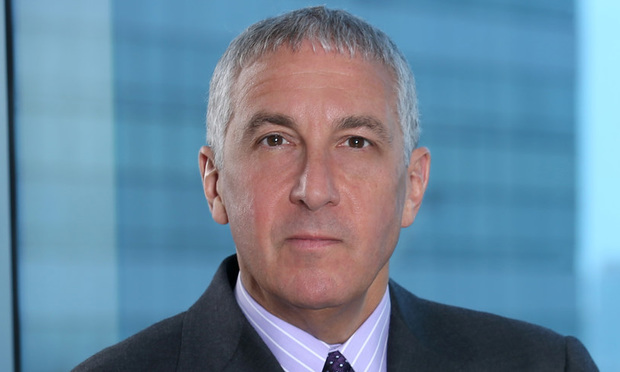Don't Panic: How Struggling Firms Can Keep Partners From Fleeing
Berger Singerman's Paul Singerman suggests how to turn a crisis into an opportunity.
September 10, 2019 at 01:46 PM
5 minute read
The original version of this story was published on The American Lawyer
 Paul Singerman, Berger Singerman
Paul Singerman, Berger SingermanThe collapse of LeClairRyan served as the latest reminder that when a law firm partnership finally loses its faith, the party is over. But that doesn't necessarily mean firms can't pull out of a spiral.
Experts in law firm management and dissolution say the right approach to communicating with partners, staff and other stakeholders can make all the difference when a firm is tested — and sometimes a crisis can become an opportunity.
"There's no reason why a law firm cannot resurrect itself and right wrongs if it has the right leadership and something more than just money holding the firm and the partners together," said Paul Singerman, a co-chair and partner at Miami-based Berger Singerman who has spent years working on liquidations for law and accounting firms.
LeClairRyan filed for bankruptcy earlier this month and owes nearly $15 million to two secured creditors, according to documents filed in the Eastern District of Virginia. The Chapter 11 filing comes after years of declining revenue, a failed venture with an alternative legal service provider, and an exodus of attorneys.
When the Am Law 200 firm announced in early August that it would dissolve, it became clear that the once-profitable firm had been in trouble for years — and it ultimately failed to navigate the hardship as it bled both partners and profits.
LeClairRyan's efforts couldn't stem the departures and revive the loyalty of its lawyers. But Singerman said times of unrest can also present openings for firms, including the opportunity to hold partners accountable whether they are former rainmakers who are no longer pulling their weight, attorneys who are being overcompensated given the current financial status of the firm or others.
"Having the courage to hold people accountable means making tough decisions when there is still time for them to matter," he said.
Like other businesses, law firms will always be subject to good years and bad years, Singerman noted. That's why he said it's so important that firms cultivate a strong culture and leadership team that can excel during a time of success and be strong enough to withstand threats that could lead to failure.
Singerman added that as a firm is taking steps to whittle down its workforce to try to right a sinking ship, it is just as important to let high performers know they are appropriately valued.
"What's never talked about is making sure that the firms are listening to and taking care of and addressing the interest of the performers," he said, noting that if a high achiever loses faith and decides to leave, it will only hurt the firm more. "Instead of spending all of the leadership's and management's time on problem makers and causers, they should also give positive focus to those doing a good job."
As soon as high-performing partners feel like they're not supported and dissatisfaction takes hold, headhunters for other firms will find easy prey, said longtime legal management consultant Brad Hildebrandt, who has experience with multiple law firm restructurings and dissolutions.
"Once you get to that point, you don't have a firm anymore," he said.
Hildebrandt pointed out that there could be many underlying issues behind a law firm's troubles: lack of billing discipline, staff not pulling their weight, underperforming partners, poor leadership and more. By the time many firms call him for help, they are already in too much trouble to be saved—but, if the culture is collaborative enough, it can be the firm's best chance at survival, he said.
"If the partnership wants to stay together then, ultimately, you have a good chance of keeping it together," he said.
Of course, a firm's cultural glue has its limits, especially when the money runs out. That's one reason Les Corwin, the head of Eisner's New York office, emphasizes the importance of managing a firm's debt and finances.
"Your best relationships should be with who your bankers are," Corwin said. He stressed it's important for firms to balance their books and keep a clear line of communication with involved parties, such as primary lenders and creditors.
"Firms need to know what their whole banking relationship is — who's funding things, and how?" he said. "Always keep [the lenders] in the loop."
Corwin added that it is equally important for a firm to be transparent with its partnership throughout a process of cutting costs or restructuring.
"Communication is key," he said. Adjusting to financial hardship is tough for any firm, he said, which is why it's important to prepare partners and staff alike for tough decisions ahead. "Get buy-in and their commitment—the key people should be locked in," he said.
Then there's that other key group: clients. Hildebrandt said a strong culture through troubled times is also the best way to quell anxieties that can set back efforts to keep and develop business.
"Clients panic when the partners panic," he said. "Once the clients panic, you have big trouble."
This content has been archived. It is available through our partners, LexisNexis® and Bloomberg Law.
To view this content, please continue to their sites.
Not a Lexis Subscriber?
Subscribe Now
Not a Bloomberg Law Subscriber?
Subscribe Now
NOT FOR REPRINT
© 2025 ALM Global, LLC, All Rights Reserved. Request academic re-use from www.copyright.com. All other uses, submit a request to [email protected]. For more information visit Asset & Logo Licensing.
You Might Like
View All
EB-5 Rebounds After a Rocky Year: Challenges of 2024 Lay Groundwork for a Booming 2025

Greenberg Traurig, Holland & Knight Leaders Expect AI Investments to Jump in 2025
5 minute read
Leveraging the Power of Local Chambers of Commerce: A Second-Career Lawyer’s Guide to Building a Thriving Practice
5 minute readTrending Stories
Who Got The Work
J. Brugh Lower of Gibbons has entered an appearance for industrial equipment supplier Devco Corporation in a pending trademark infringement lawsuit. The suit, accusing the defendant of selling knock-off Graco products, was filed Dec. 18 in New Jersey District Court by Rivkin Radler on behalf of Graco Inc. and Graco Minnesota. The case, assigned to U.S. District Judge Zahid N. Quraishi, is 3:24-cv-11294, Graco Inc. et al v. Devco Corporation.
Who Got The Work
Rebecca Maller-Stein and Kent A. Yalowitz of Arnold & Porter Kaye Scholer have entered their appearances for Hanaco Venture Capital and its executives, Lior Prosor and David Frankel, in a pending securities lawsuit. The action, filed on Dec. 24 in New York Southern District Court by Zell, Aron & Co. on behalf of Goldeneye Advisors, accuses the defendants of negligently and fraudulently managing the plaintiff's $1 million investment. The case, assigned to U.S. District Judge Vernon S. Broderick, is 1:24-cv-09918, Goldeneye Advisors, LLC v. Hanaco Venture Capital, Ltd. et al.
Who Got The Work
Attorneys from A&O Shearman has stepped in as defense counsel for Toronto-Dominion Bank and other defendants in a pending securities class action. The suit, filed Dec. 11 in New York Southern District Court by Bleichmar Fonti & Auld, accuses the defendants of concealing the bank's 'pervasive' deficiencies in regards to its compliance with the Bank Secrecy Act and the quality of its anti-money laundering controls. The case, assigned to U.S. District Judge Arun Subramanian, is 1:24-cv-09445, Gonzalez v. The Toronto-Dominion Bank et al.
Who Got The Work
Crown Castle International, a Pennsylvania company providing shared communications infrastructure, has turned to Luke D. Wolf of Gordon Rees Scully Mansukhani to fend off a pending breach-of-contract lawsuit. The court action, filed Nov. 25 in Michigan Eastern District Court by Hooper Hathaway PC on behalf of The Town Residences LLC, accuses Crown Castle of failing to transfer approximately $30,000 in utility payments from T-Mobile in breach of a roof-top lease and assignment agreement. The case, assigned to U.S. District Judge Susan K. Declercq, is 2:24-cv-13131, The Town Residences LLC v. T-Mobile US, Inc. et al.
Who Got The Work
Wilfred P. Coronato and Daniel M. Schwartz of McCarter & English have stepped in as defense counsel to Electrolux Home Products Inc. in a pending product liability lawsuit. The court action, filed Nov. 26 in New York Eastern District Court by Poulos Lopiccolo PC and Nagel Rice LLP on behalf of David Stern, alleges that the defendant's refrigerators’ drawers and shelving repeatedly break and fall apart within months after purchase. The case, assigned to U.S. District Judge Joan M. Azrack, is 2:24-cv-08204, Stern v. Electrolux Home Products, Inc.
Featured Firms
Law Offices of Gary Martin Hays & Associates, P.C.
(470) 294-1674
Law Offices of Mark E. Salomone
(857) 444-6468
Smith & Hassler
(713) 739-1250







